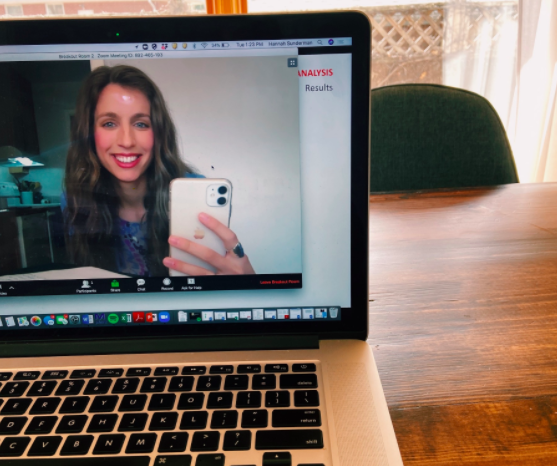
Lincoln, Neb. —Hannah Sunderman will always remember March of 2020, as she celebrated her 26th birthday and successfully defended her dissertation, “The Development of Generativity Among College Student Leaders Who Mentor: A Growth Curve Analysis,” virtually via Zoom.
“Not everyone gets to defend a dissertation during a global pandemic,” Sunderman said.
Within the Agricultural Leadership Education and Communication Department in the College of Agricultural Sciences and Natural Resources, the tradition is to hold an open dissertation defense, where all friends and family are invited to watch.
Sunderman did just that – in front of almost 30 people including her parents, family members, in-laws, departmental colleagues, friends from all over the country, and the committee, of course.
“I was very proud of my parents, who had never Zoomed before. They did a good job and it was fun to have everyone there,” Sunderman said.
As concerns with social distancing and the threat of COVID-19 rose the week before, Sunderman kept in close contact with her advisor, Lindsay Hastings, and eventually made the call to present online once the university moved classes online.
“At one point after I got done presenting, Lindsay unmuted everyone on Zoom so they could all cheer and ask questions,” Sunderman said.
A South Dakota native, Sunderman toured Nebraska with two friends on a whim and ended up beginning her undergraduate career in the College of Journalism and Mass Communications.
“I took stats classes in undergraduate research and really fell in love with the idea of research, too, in addition to working with students,” she said.
Sunderman received her bachelor’s degree from UNL in psychology and planned to work in a corporate setting in human relations.
“I had ‘aha’ moments in undergrad, where I really felt like I was maximizing my talents in a way that was challenging and growth-facilitating,” Sunderman said.
At the time, the NHRI Leadership Mentoring had an opening for a doctoral research assistant, and Lindsay Hastings encouraged Sunderman to apply .
Aligning her strengths and interests in graduate school, Sunderman studied generativity, which refers to someone’s care or concern for the next generation. She surveyed NHRI Leadership students to see how invested they were in teaching and mentoring younger people. While generativity occurs typically between ages 40-65, according to Sunderman’s research, generative behavior had a significant and positive increase over time among college student leaders who mentor, an exciting find for the field.
“I feel like graduate school can be stressful and a long journey, but for me it was really a positive, life-giving four years,” Sunderman said.
“I love the work at my job and I also had such a great experience with my colleagues and the undergraduate students. Because of our strong collaboration I’ve emerged with lots of good colleagues and friends. That’s made my experience much more rewarding due to the relationship with undergrads and faculty,” Sunderman said.
Sunderman’s involvement with NHRI Leadership Mentoring began as undergraduate leadership mentor. Since then she’s helped teach a summer camp for 5th grade students, assisted with orientation and various related events, provided strengths feedback, taught an ALEC 102 experiential learning class, worked as a doctoral research assistant and served as associate director for the institutes’ leadership program. Sunderman also received the 2020 Outstanding Graduate Student Leadership Award during CASNR Week.
Sunderman’s long history with the institute will now come full circle.
On July 1, Sunderman will begin a faculty position within ALEC as a professor of practice and NHRI Leadership mentoring program director.
“I’ve been here for eight years and Nebraska still can’t get rid of me,” Sunderman said. “I’m very excited to stay in Lincoln.”
By Natalie Jones | IANR Media







